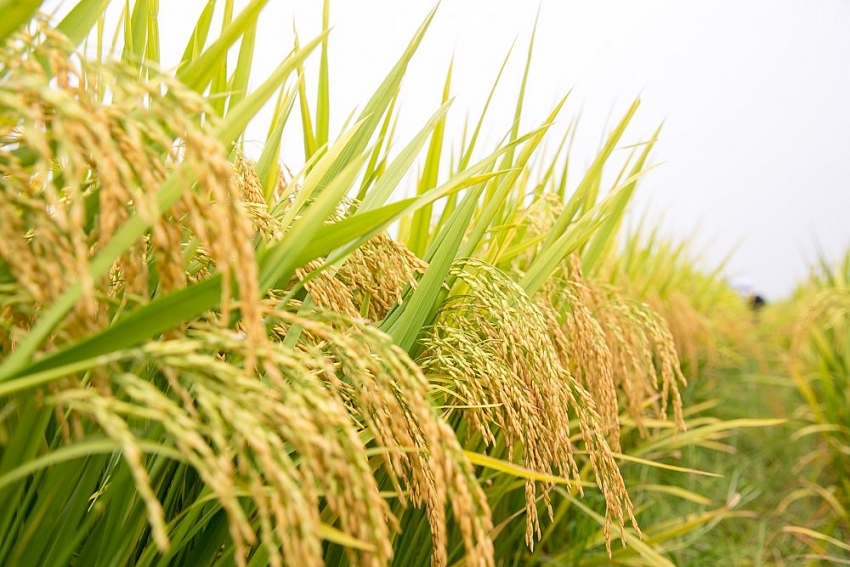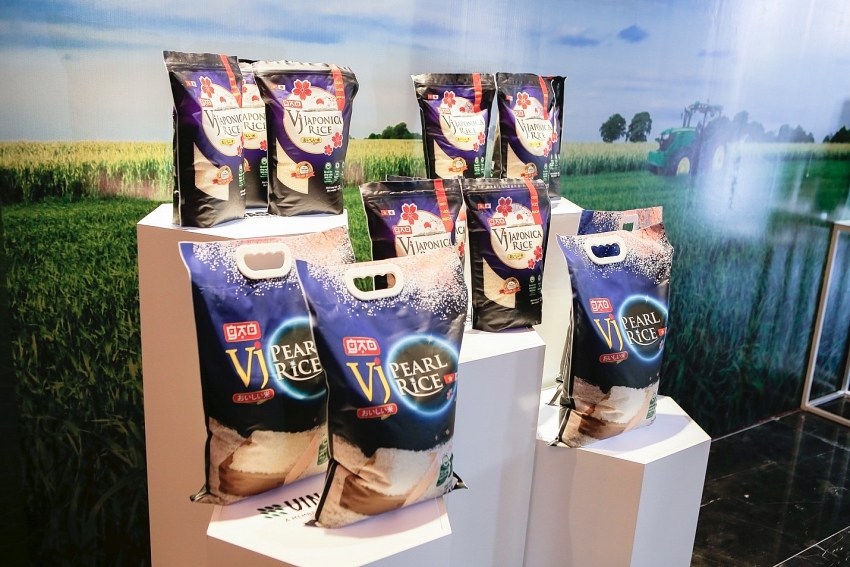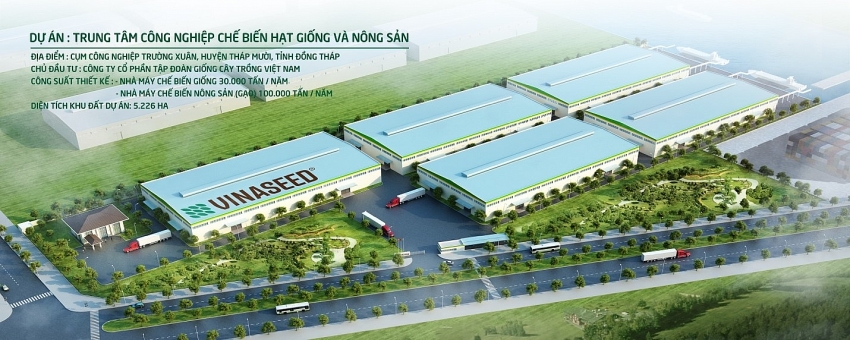Vinaseed – a member of The Pan Group – races into new development era
In recent times, most of Vietnam’s famers have been facing difficulties in making ends meet with isolated and scattered farming practices. They were also at the mercy of unfortunate market mechanisms, such as low yields or good crop, bad price” or unproductive post-harvest practices when prices were piteously low.
 |
| "Thom RVT" rice seeds - a popular product of Vinaseed - has the advantage of rice quality, salinity tolerance and alum resistance. |
As a member of The PAN Group – aleading company in agriculture and the food industry –Vinaseed is a leading scientific and technological corporation operating in agricultural production, with a strong focus on research, production, and trade in agro-forestry plant seeds.
50 years after its establishment, Vinaseed has become one of the leading enterprises in the Vietnamese seed industry, achieving more than VND1.5 trillion ($65.2 million) in sales, 80 per cent of which stems from patented seeds. The company has 29 members located in different ecological regions across the country, especially the Red River Delta and the Mekong Delta, with nearly 2 million hectares of cultivation area.
At its 50-year anniversary ceremony, chairwoman and general director Tran Kim Lien officially announced renaming the company to Vietnam National Seed Group (Vinaseed Group) and launched the new Corporate Identity Programme (CIP), setting the company on course towards new heights, with the particular goal of becoming Vietnam’s leading corporation providing sustainable agricultural development solutions to the international market.
 |
| Vinaseed officially changed its name to "Vietnam Seed Corporation" and launched a new corporate identity. |
Thanks to its extensive network with farmers and intensive experience in production organisation, Vinaseed has created a full value chain to differentiate itself from other seed businesses. The company’s process includes seed – cultivation – post-harvest preservation – product brand building – consumption. Taking advantage of this closed-loop value chain, Vinaseed is able to generate traceable, quality products as well as to control its large-scale production process both for domestic consumption and export. The company is now focusing on high-margin segments by providing good-quality agricultural products with a lot of added value gained from science and technology, such as premium rice, jasmine rice, and Japonica rice.
To set itself apart, Vinaseed has been evading extensive investments while concentrating on predominant fields and products based on crop seeds. In 2018-2021, Vinaseed intends to mainly develop two key value chains for organic rice and fresh vegetables together with the value chain of the holding company, The PAN Group.
Utilising its 50 years of experience in agricultural production and local know-how, together with its nationwide crop seed production network, Vinaseed has selected a number of locations that could serve as farming zones for its organic rice.
 |
Vinaseed introduces new high-grade VJ Pearl Rice produced by Japanese technology
Vinaseed has been constantly improving its patented seeds by keeping advantageous and purebred traits. Also, the company has ensured stable productivity and quality, implemented its farming management process to guarantee traceability, and built farming zones meeting Viet-gap standards and specialised production zones in different ecological areas. Farmers in the company’s chain can access interest-free loans to fund their production and their incomes have been stabilised via associated production. Their productivity has been largely enhanced by mechanisation, which also helped reduce costs.
To develop the value chain of agricultural products and high-quality vegetables, Vinaseed has set up a 21.59-hectare greenhouse for Japanese melons at Hanam Hitech (wholly owned by Vinaseed) utilising high-tech facilities from Japan and Israel. The company has gradually created a value chain for its premium agricultural products in the Red River Delta. This has led the firm to become a regional pioneer in research, the application and transfer of high-tech agricultural technology within the closed value chain of holding company ‘Farm – Food – Family’.
In 2018, Vinaseed has also developed the VND260 billion ($11.3 million) Industrial Center project of seeds and agricultural products processing mill (Dong Thap province). This Industrial Centre is expected to be the largest and most modern centre for seeds and agricultural product preservation in Vietnam. It will take up 5.2 hectares and process 30,000 tonnes of seeds and 100,000 tonnes of rice per year, with the total investment capital of VND216-230 billion ($9.39-10 million).
The project will come into operation in 2020 and become a model at the Mekong Delta region, while at the same time transferring farmers into the company’s value chain in order to build large-scale production hubs for high-quality seeds and first-rate rice.
 |
| Vinaseed’s Industrial Center project of seeds and agricultural products processing at Thap Muoi Village, Dong Thap province |
With its strategy and actions closely aligned with the closed ‘Farm – Food – Family’ value chain of The PAN Group, Vinaseed aims to dominate the Vietnamese plant seed sector and to sustain an average pace of growth at 20-25 per cent per year until 2021.
Models like Vinaseed are a necessity in Vietnamese agriculture as they can potentially rule out bumper devaluation. This will lead to higher economic value for farmers and members of co-operative farms. The optimal way to develop Vietnamese agriculture is to proceed from quality seeds and advanced technological production towards world-standard outputs.
| Established in 1998, The PAN Group is currently the leading company in agriculture and the food industry, with total assets of VND7.6 trillion ($330.43 million) at the end of the second quarter of 2018. Its members include leading companies in the agriculture and food sectors like Vinaseed, PAN-SALADBOWL, Fimex, Bibica, Lafooco, AquatexBentre, and 584 Nha Trang Seaproduct. The PAN Group’s major shareholders include NDH Invest, SSI, CSC Vietnam, The Asian Entrepreneur Legacy (TAEL) Partners, GIC, PYN, and – the latest addition – Sojitz. With a commitment to creating sustainable values on behalf of farmers, families, and society by offering trusted and innovative agricultural and food products, PAN has achieved a robust revenue CAGR of nearly 80 per cent over the past five years. The company expects to expand significantly in the next few years. |
What the stars mean:
★ Poor ★ ★ Promising ★★★ Good ★★★★ Very good ★★★★★ Exceptional
 Tag:
Tag:
Related Contents
Latest News
More News
- The generics industry: unlocking new growth drivers (February 04, 2026 | 17:39)
- Vietnam ready to increase purchases of US goods (February 04, 2026 | 15:55)
- Steel industry faces challenges in 2026 (February 03, 2026 | 17:20)
- State corporations poised to drive 2026 growth (February 03, 2026 | 13:58)
- Why high-tech talent will define Vietnam’s growth (February 02, 2026 | 10:47)
- FMCG resilience amid varying storms (February 02, 2026 | 10:00)
- Customs reforms strengthen business confidence, support trade growth (February 01, 2026 | 08:20)
- Vietnam and US to launch sixth trade negotiation round (January 30, 2026 | 15:19)
- Digital publishing emerges as key growth driver in Vietnam (January 30, 2026 | 10:59)
- EVN signs key contract for Tri An hydropower expansion (January 30, 2026 | 10:57)






















 Mobile Version
Mobile Version